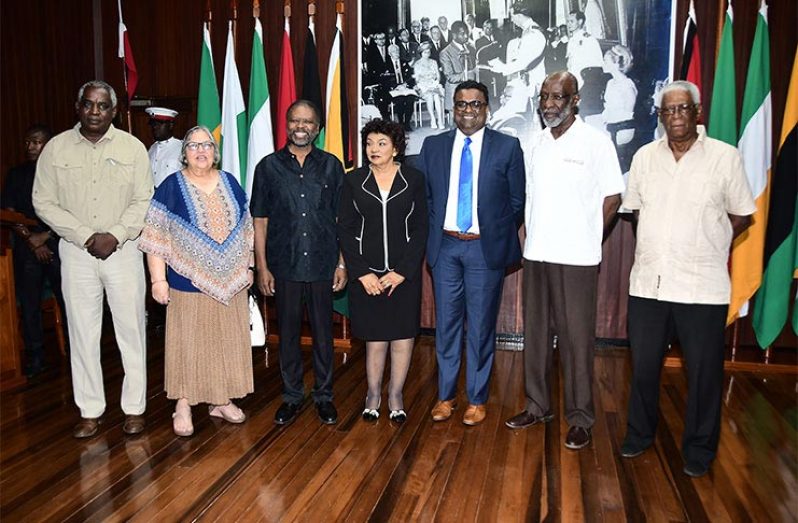IN its report on the national recount, the CARICOM Scrutinising Team used the opportunity to urge that the Guyana Elections Commission (GECOM) immediately pursue reforms which will no longer make it “a creature of political parties”.
The CARICOM report, submitted on Monday, was highly critical of many of the actions of the commission which the team believes could have been avoided, had the electoral body been truly independent. “What is obvious is that the structural independence of GECOM from the machinery of government is not equated with its impartiality. Indeed, from its beginning, given the intrinsic political distrust and ethnic polarisation in the country, GECOM was never conceptualised as an institution which would exemplify autonomy from partisan political influences. While this model of balanced partisan representation – not unique in the Commonwealth Caribbean – in which the two dominant parties have equal representation and input was born out of a particular historical conjecture, it has served its initial purpose,” the report stated.
A POLITICAL COMMISSION
The current make-up of the commission where there is one Chairperson; three Commissioners nominated by the government and three by the opposition, was birthed out of the Carter Formula, which was later integrated into the Constitution. In 2001, 2006, 2015 and 2020, the centre stated that, in the interest of future elections, Guyana should consider reforms that would reduce the politicised composition of GECOM and move toward an Electoral Management Body (EMB).
Making its own observations during the recount, the CARICOM Scrutinisng Team said that to maintain the present form of GECOM would be “a tragedy for the nation and the people of Guyana”. Their report stated: “The commissioners are primarily, though not exclusively, dominated by the ethos of positing their respective parties to political victory. We therefore urge the immediate rethinking of the structural organisation of GECOM, particularly with respect to the selection of the commissioners.” It said that while GECOM is described as an independent body, it is “undoubtedly a political commission” which continues to contribute to high levels of internal discord. “This is unsurprising giving the tribalised nature of politics in the country and the appointment process of commissioners. Their subsequent behavior, and their public posturing are functions of the ethnic-based politics in the country combined with the zero-sum politics of the intrinsically Westminster arrangements which are deeply embedded in Guyana despite the more significant post-independence altercations to the inherited political model of government,” the report added.
It highlighted that, in such case, GECOM Chair Justice (Ret’d) Claudette Singh – who was appointed in 2019 — came under much pressure and manipulation in having to “walk a very thin line between the two political camps”.
In the rethinking of the structural organisation of GECOM, particularly with the selection of commissioners, the team recommended a model which emphasises non-partisan and professional body appointed on the basis of merit qualification rather than loyalty, or a partial partisan but politically broaden body in which the equal major political power balancing is avoided.
It noted that the commission can, where it perceives difficulties in carrying out its mandate, pass any order designed to facilitate its functioning, according to law. “Thus, the power to amend all election law is lodged in the hands of GECOM and is subject to negative resolution by parliament,” the report pointed out.
ROOM FOR IMPROVEMENT
These were not the only criticisms coming to the commission as the CARICOM team also recommended a political audit of the elections body’s commission and administrative arm analysing its successes, failures and what led to them.
“It therefore behoves whichever political party which emerges victorious from these elections to initiate an immediate political audit as, in a very real sense, GECOM betrayed its obligations to behave impartially and independently,” the report stated.
During the process of the recount, the CARICOM team stated that while it observed that the GECOM staff who manned the vast majority of workstations were well-trained on procedural matters, there were varying degrees of efficiency and effectiveness of the staff. It stated: “Some of these workers sometimes appeared to be unfamiliar with the process and this may have contributed to the timidity that we witnessed.” It therefore called for greater emphasis on voter education and greater emphasis on the training of Presiding Officers and citizens on the handling of ballot papers. The CARICOM Team also spoke to the absence of statutory documents in 29 ballot boxes, which it said points to “need for a serious investigation by GECOM”.



.jpg)










